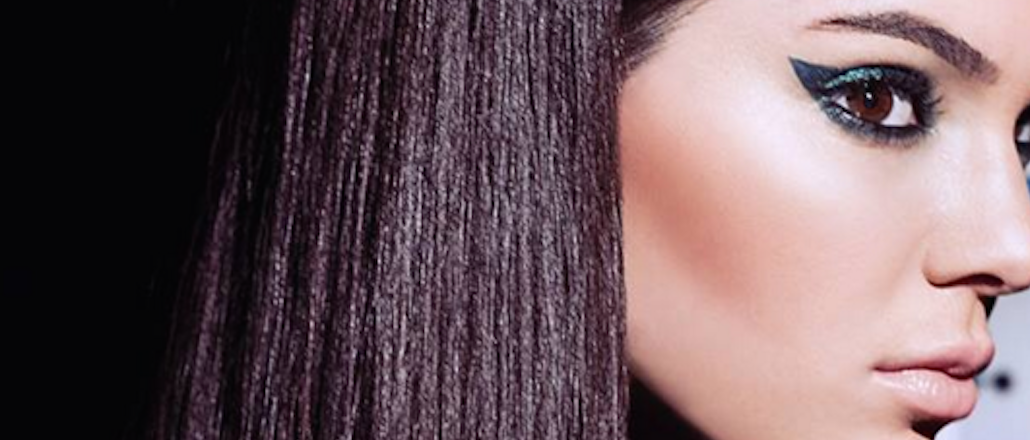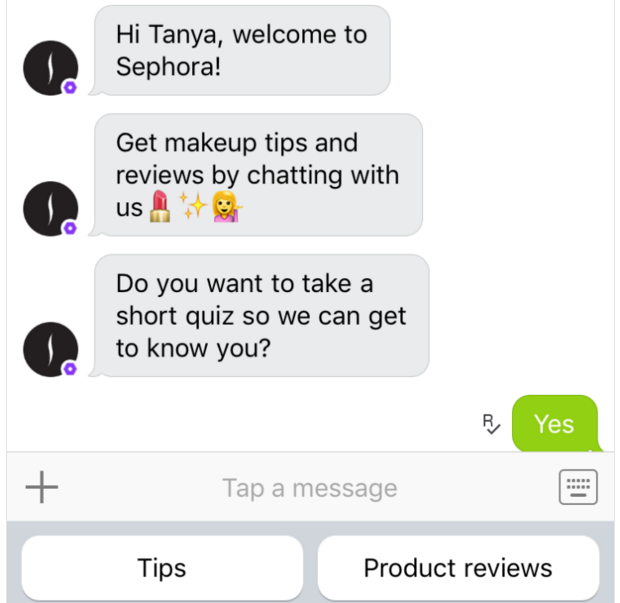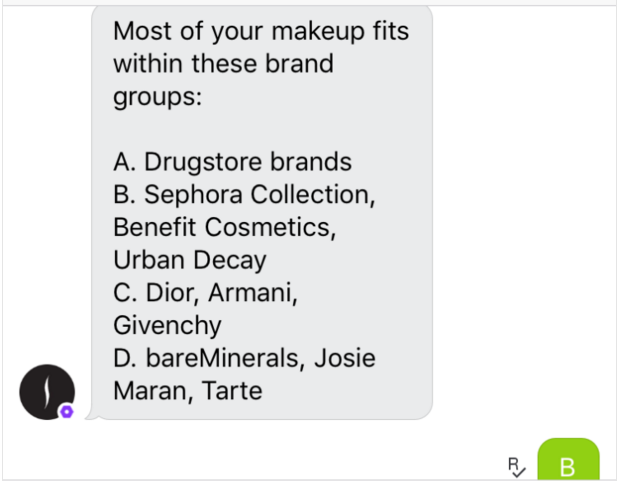
Need a new lip gloss? Skip the store and download Kik.
Sephora became the first beauty brand to make its debut on the messaging app Monday, aiming to drive sales by offering a one-to-one chat experience on mobile. Users will now be able to not only get their beauty product reviews, recommendations and tips instantly, but also make purchases directly on the app.
“We’ve had our eye on what Kik is doing for a while now and strongly believe that it is a top app that offers Sephora a new avenue of connection with our clients,” said Bindu Shah, Sephora’s vp of digital marketing. “Brand engagement and client acquisition, particularly of the highly mobile and connected audience of Gen-Z and younger millennials, was a huge draw for us.”
For millennials and teens around the world, messaging apps like Kik, WhatsApp, WeChat and Line have increasingly become preferred mediums of communication. About 42 percent of Kik’s 275 million-strong user base is aged 18 to 24, according to comScore, whereas Facebook-owned WhatsApp recently announced that hit a billion active mobile users. A swath of brands, retailers and publishers, from K-Swiss and Burger King to The Washington Post, have been flocking to these apps.
“It shows the opportunity for brands to not only be perceived as a service provider but as a knowledgeable friend, adding real value to users,” said Ben Kosinski, head of The Collaboratory at iCrossing. “It’s smart for the brand to go where the users are and create a presence on these platforms while providing relevant and personalized one-to-one conversations with consumers.”
Sephora’s interaction with its customers on Kik is also designed to resemble a regular conversation. All users have to do is add Sephora on the platform and start a conversation. The chatbot then provides a brief introduction, welcoming them and explaining that they can get makeup tips and reviews by chatting with Sephora. There’s the requisite amount of emojis sprinkled in too.

Sephora has also created a personalized experience for its customers through a small quiz on the app, using the results to serve them appropriate content and products tailored to their individual tastes. These recommendations are based on a range of questions about their age group, favorite makeup items, brands and products they cannot live without. The end product is a piece of content based on their interests. This reporter was treated to a video tutorial by Bobbi Brown on how to create a winged eyeliner look, for instance. Users can also search for product categories, read reviews of specific items and purchase them which are housed on native pages within the app.
“With Kik, we’re able to leverage our extensive library of how-to content, videos, images, and text tips in a new way,” said Shah. “We know ratings and reviews are a very important and trusted part of her decision-making journey — and now, she can use the Kik chatbot as a resource instantly, rather than waiting for relevant content to appear in a news feed.”
The brand also asks people what types of products they already use to find out more about them, via a pop-up keyboard that offers options. There is an obvious data play here — the more it knows about its customers, the better it can personalize recommendations and deepen brand loyalty.

“As a brand or retailer, you want as little friction to get a consumer to complete a purchase as possible,” said Jaclyn Ling, director of retail at Kik. “So why not use a platform that can make it as instant and as frictionless as possible?”
Chatbots not only serve to help brands and retailers create more efficient and enjoyable interactions and build brand loyalty either. They are, so the pitch goes, beneficial to the consumer too. Consumers can get highly personalized recommendations, complete purchases and even track orders and shipping, said Puneet Mehta, founder and CEO of Msg.Ai, which automates brand interactions in messaging apps in real time. “Messaging enables both communication and rich experiences previously reserved for apps or mobile sites,” he said.
Sephora, for its part, has long been ahead of the digital curve. Apart from a robust social presence, it opened its Innovation Lab for business in San Francisco last year, cementing its position as the frontrunner in digitizing the beauty retail space. Its social marketing team continually tests emerging platforms to offer clients the latest and and easiest ways to engage with the brand as well, according to Shah.
“The launch also reinforces our commitment to providing our clients a place to learn about beauty in fun and new ways that work seamlessly into their daily routines,” she said. “At Sephora, we pride ourselves on being both innovative and agile, incorporating these attributes into everything we do.”
More in Marketing

Zero-click search is changing how small brands show up online — and spend
To appease the AI powers that be, brands are prioritizing things like blogs, brand content and landing pages.

More creators, less money: Creator economy expansion leaves mid-tier creators behind
As brands get pickier and budgets tighten, mid-tier creators are finding fewer deals in the booming influencer economy.

‘Still not a top tier ad platform’: Advertisers on Linda Yaccarino’s departure as CEO of X
Linda Yaccarino — the CEO who was never really in charge.





